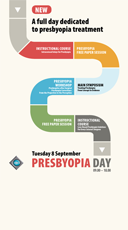Posters
(results will display both Free Papers & Poster)
Combined photorefractive keratectomy and high energy accelerated cross-linking: standard cross-linking after intrastromal corneal ring implantation for keratoconus
Poster Details
First Author: J.Arbelaez OMAN
Co Author(s): M. Arbelaez
Abstract Details
Purpose:
To determine the safety, efficacy and stability of photorefractive keratectomy (PRK)/trans-PRK and simultaneous standard/accelerated corneal crosslinking after Intrastromal corneal ring segment (ICRS) implantation in patients with keratoconus.
Setting:
Muscat Eye Laser Center, Muscat, Oman
Methods:
We included patients with early keratoconus who received an ICRS (Keraring, Belo Horizonte, Brazil) 1,6 years in average before enrolment. PRK (or Trans-PRK) was performed with the Amaris 750S (Schwind) using customized profiles, optical zones between 5.25 to 6.7 mm, and ablations between 22 to 85µm. Next, 9 eyes with high energy accelerated crosslinking XTRA (Avedro), and 7 eyes standard Crosslinking KXL at the same day. Follow-up was performed at months 3, 6, and 3 years in average including; UCVA, BCVA, refraction, keratometry, placido topography (KeratronScout, Optikon), and Scheimpflug imaging (Sirius, CSO Inc. and Pentacam, Oculus).
Results:
This study included 16 eyes (12 patients) of mean age 31.8 ± 8.3 years (range 23-50 years). 19% of patients had stage 1 keratoconus whereas 56% had stage 2 and 25% stage 3. At 2,9 years of follow up (SD 1.06, min 1.1 max4.6) as compared to pre-operatively (post ICR) there was a significant improvement in mean UCVA (0.32 vs 0.56 ; p0.000), BCVA (0.65 vs 0.76; p=0.007), cylinder (-2.03 vs -1.20 D; p=0.031). No statistically difference found on the sphere (-0.60 vs +0.29 D; p=0.134). Although Kmax increase, the difference was not statistically significant (49.73 vs 50.15 D; p=0.301).
Conclusions:
Simultaneous PRK/Trans-PRK and XTRA or KXL following ICRS implantation appears to be a safe and effective treatment that helps to improve functional vision in patients with keratoconus and shows a long-term stability.
Financial Disclosure:
NONE





